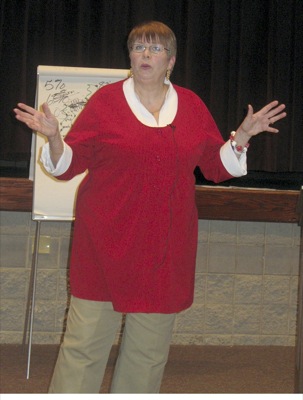Monday, February 13th, 2012
Expert tells audience drug use a problem everywhere
Parents encouraged to get educated, talk to teens
By Margie Wuebker

Photo by Margie Wuebker/The Daily Standard
Adriane Scherrer, a substance abuse counselor in Middletown, warns people attending a Sunday afternoon program at New Bremen High School that no community is immune to drugs. The New Bremen Emergency Squad sponsored the program.
NEW BREMEN - Adriane Scherrer, a substance abuse professional for the past 30 years, believes no community is immune from drugs.
"Don't think it doesn't stop in New Bremen, Ohio," the Middletown woman told those attending a Sunday afternoon drug prevention program sponsored by the New Bremen Emergency Squad. "Drug deals are going down here, and don't tell me they aren't."
Scherrer said some parents dismiss comments regarding the danger of marijuana, saying they smoked weed in the 1960s, '70s and '80s without any ill effects.
"Marijuana is a totally different drug today, and people do not realize how dangerous it is," she said. "In the 1960s, marijuana contained 5 percent of the active ingredient THC. In the 1980s, the amount was 20 to 30 percent. Today, the amount of active THC is 52 percent."
THC intoxication causes distorted perception, impaired coordination, difficulty with thinking and problem solving. It also plays havoc with memory and learning. Prolonged use escalates the side effects, she added.
Thirteen states have legalized marijuana for medicinal use, but five of those states are seeking to repeal the legality through ballot issues in May or November. Scherrer believes other states are likely to follow suit as more is learned about the long-lasting effects including tar-like deposits in the brain.
Legal drugs are also a growing concern.
Scherrer said prescription medication is readily accessible to many youths through the family medicine cabinet.
She shared how a dentist prescribed 30 vicodin tablets after she underwent a root canal. When she asked why he prescribed so many, he responded it was standard operating procedure. She tore the prescription into little pieces.
Scherrer told of clients who went to parties where the price of admission was three vials of prescription drugs, all dumped into a large bowl. Games ensued with losers dipping into the bowl and swallowing pills without any knowledge of what they were or what problems they could cause.
"Once you get addicted to opiates, you are in a life of hell," she said.
Also very addictive is heroin, which is considerably cheaper than purchasing prescription drugs on the streets, she said.
"Seventy percent of the heroin we're seeing in the area comes out of Dayton," Scherrer said.
Crack cocaine and crystal methamphetamine are a scarier threat - 47 percent of people become addicted the first time they use the drug and 47 percent the second time. Two percent escape addiction for some unknown reason while the remaining 4 percent die.
"People don't escape crack ... they try it one, two and three times at the same party," she said. "They can't walk away."
Scherrer also discussed huffing poop - another method young people use to get high.
In her pursuit of learning about the technique, she said she found mason jars containing feces and urine setting in the sun along a fence during a football practice. The contents of the jar heat up and the accumulating gas is collected in an attached balloon.
"Huffing the contents causes a high that lasts for an hour, and the huffer's mouth tastes like poop," Scherrer added with a smile. "Kids are so smart, they are stupid."
Seventy percent of youths drink alcohol by the age of 18, while 10 percent of 12-year-olds and 20 percent of 13-year-olds drink when they are away from home. She believes too many parents rely on programs like DARE to encourage youths to stay away from alcohol and drugs.
Scherrer said parents should ask questions and not be afraid to check their children's rooms or belongings. They also need to educate themselves about the problem.
She proposes a new commercial regarding the drug problem should be 'Education - the anti-drug - Let's Keep Talking.'


